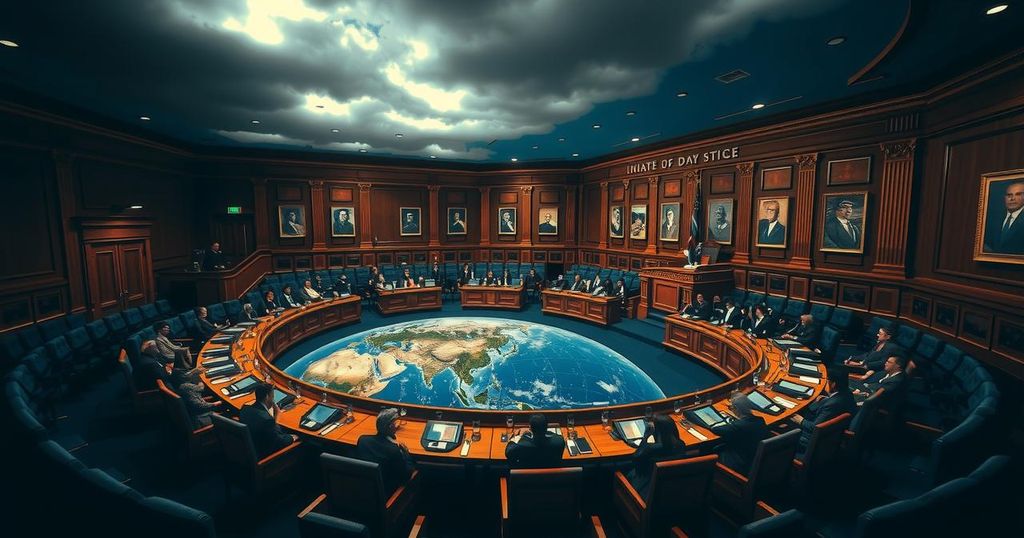Climate change
ASIA, AZERBAIJAN, CLIMATE, CLIMATE CHANGE, ENVIRONMENTAL POLICY, EUROPE, GLOBAL WARMING, HAGUE, INTERNATIONAL COURT OF JUSTICE, ISLANDS, NETHERLANDS, PACIFIC OCEAN, PARIS AGREEMENT, PEACE PALACE, PH GOV, PISFCC, PRASAD, STUDENTS FIGHTING, THE HAGUE, UN, VIS, VISHAL PRASAD
Isaac Bennett
0 Comments
International Court of Justice to Conduct Landmark Hearings on Climate Change
The International Court of Justice will begin hearings next week to establish a legal framework for nations to address climate change, with over 100 countries participating. Activists hope for impactful outcomes, though there is concern about the long timeline for responses. The hearings follow a controversial climate agreement at COP29, which many feel does not adequately protect vulnerable nations. Key questions about state responsibilities will guide the discourse during this pivotal event.
In an unprecedented move, the International Court of Justice (ICJ) will commence hearings next week aimed at formulating a legal framework for nations to uphold their obligations in mitigating environmental damage from greenhouse gas emissions. From Monday, representatives from over 100 countries and organizations are set to present their cases in The Hague, marking a historic gathering for such discussions. Activists are hopeful that the judges’ advisory opinion will significantly influence the ongoing battle against climate change, although skepticism remains regarding the overall impact of this non-binding opinion, which may take months or years to materialize.
The initiative follows a contentious climate agreement reached at the recent COP29 summit in Azerbaijan, which commits developed nations to provide at least $300 billion annually by 2035 for climate financing. However, many developing nations have criticized this commitment as woefully inadequate, especially as the agreement lacks a global commitment to reduce dependency on fossil fuels. Amidst this backdrop, the UN General Assembly previously tasked the ICJ with two fundamental questions regarding states’ legal responsibilities to protect the climate system and the repercussions of causing significant harm to vulnerable nations.
Vishal Prasad, director of the Pacific Islands Students Fighting Climate Change, emphasized that climate change is an immediate concern for many vulnerable communities, stating, “Climate change for us is not a distant threat. It is reshaping our lives right now.” This urgency has propelled advocacy efforts, culminating in a united request for the ICJ’s advisory opinion. Legal experts anticipate that while the ICJ’s opinion may not delve into specifics, it will nonetheless establish a legal framework that can guide future climate litigation at all levels.
As the proceedings commence, a variety of stakeholders, including major greenhouse gas emitters such as China and the United States, will contribute their perspectives. The hearings will conclude with insights from organizations such as the European Union and the Organization of the Petroleum Exporting Countries, further broadening the discourse surrounding climate responsibilities. Prasad emphasized the dual nature of this advisory opinion, indicating that the objective is not solely to address losses but also to outline potential protective measures for vulnerable communities.
The International Court of Justice is convening to explore crucial legal questions surrounding climate change policies at the behest of the UN General Assembly. This unprecedented gathering brings together representatives from more than 100 entities to discuss the environmental responsibilities of nations under international law and the legal ramifications of failing to uphold those responsibilities. Such dialogues are essential in the context of increasing climate emergencies, particularly for developing countries facing existential threats from rising sea levels and extreme weather patterns. The outcome of these hearings could lay the groundwork for future legislation and accountability measures in environmental law, making it a pivotal moment in global climate action.
The upcoming hearings at the International Court of Justice represent a significant step in addressing the legal aspects of climate change. With a diverse range of participants and urgent questions raised about environmental responsibilities, the court has the potential to create a foundational legal framework that informs both national and international climate policies. While the advisory opinion may take time to finalize, its implications could resonate widely, particularly for vulnerable nations currently facing the most dire impacts of climate change.
Original Source: globalnation.inquirer.net




Post Comment